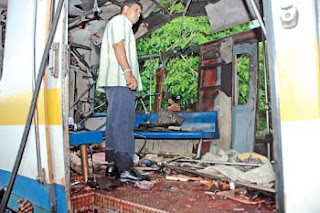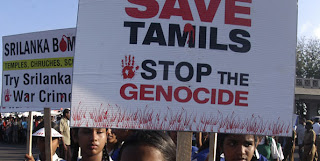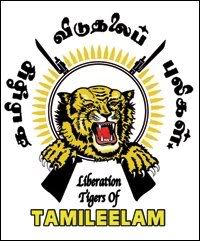The Dehiwala train bombing happened on 26 May 2008. 9 civilians were killed, including a pregnant mother and 73 more passengers suffered injuries, when the LTTE terrorists exploded a bomb inside a highly crowded Colombo-Panadura train. It is believed that the parcel bomb exploded had been placed on the luggage rack in the train, police sources claimed.
World Socialist Web Site (WSWS) claims that it is possible that the attack was carried out by the LTTE in retaliation to a bomb blast targeting a van on 23 May 2008 in LTTE controlled area, which they (the LTTE) claimed to be carried out by the Sri Lankan military.
Acknowledgement :
http://en.wikipedia.org/wiki/Dehiwala_train_bombing-2008
Wednesday, April 1, 2009
Social impacts on Dehiwala train bombing 2008
- 9 people being killed
- 80 people injured
- victims suffered fractured legs and arms and hearing loss
- prices of good increased, double or even triple
- suspicion occured between Sinhalese and Tamils but also among Sinhala people
- feel that govt should take responsiblity of the loss of innocent lives
- time and resources need to clear the mess and to rebuild lives of people
- not enough resources
For more reference and credits to
http://www.wsws.org/articles/2008/jun2008/sril-j06.shtml
http://www.wsws.org/articles/2008/jun2008/sril-j02.shtml
Comments by people
http://defencenet.blogspot.com/2008/05/explosion-in-dehiwala.html
Political Impacts
The war between the Sri Lankan government and the LTTE can be seen in the Dehiwala train bombing in 2008.The Defence Ministry blamed the LTTE for the incident adding that in its pursuit for a mono ethnic separate homeland for Tamils, the LTTE has killed and maimed innocent people including children, Tamil and Sinhala political leaders in indiscriminating bomb attacks. This had lead to a increased tension between Tamil and Sinhala poltical leaders. The cause of this bombing is actually a retaliation to the Sri Lankan armys' bombing of a van in a Tiger controlled area. With both sides not giving way to each other, the leaders of both sides will just continue this feud over the Tiger controlled area.
Economical impacts of the 2008 Dehiwala train bombing
Having plunged the island back to war in 2006, President Mahinda Rajapakse is facing a growing political and economic crisis. The military offensives in the North have effectively stalled and the shaky ruling coalition is confronting growing discontent over the war and its economic impact.
The train bombing had also caused the country to face a loss in tourism, countries like the United States of America had also give out warning to its citizen to avoid going to Sri Lanka during that period.
Prices for
acknowledgements:http://www.wsws.org/articles/2008/jun2008/sril-j02.shtml
The train bombing had also caused the country to face a loss in tourism, countries like the United States of America had also give out warning to its citizen to avoid going to Sri Lanka during that period.
Prices for
- food
- fuel and
- other basic items
are skyrocketting
acknowledgements:http://www.wsws.org/articles/2008/jun2008/sril-j02.shtml
The Psychological Impact on Dehiwala train bombing
Ah, Sorry. I can't really find anything on the psychological impact x.x
FBI in a recent report called LTTE the most dangerous terrorist outfit in the world. LTTE is a ruthless terrorist outfit notorious for crimes against innocent civilians. In its pursuit for a mono ethnic separate homeland for Tamils, the outfit has killed and maimed over tens and innocent children, Tamil and Sinhalese political leaders in indiscriminate bomb attacks.
Commuter Ramani Padmalatha, 42, told French news agency AFP that the train suddenly slowed after a "deafening noise".
"People were shouting 'bomb, bomb!' and scrambling to get out of the windows of the carriage... I managed to jump out from the door. People were stumbling out of that carriage with blood stains on their clothes, some with burns, some looking dazed," she said.
Acknowledgements:
http://www.tamilnet.com/art.html?catid=13&artid=25813
http://www.tamilnet.com/art.html?catid=13&artid=25776
http://images.google.com.sg/imgres?imgurl=http://www.spur.asn.au/LTTE_Train_Bomb_20080526_Dehiwela_15.jpg&imgrefurl=http://www.spur.asn.au/LTTE_Train_Bomb_20080526_Dehiwela.htm&usg=__3I5WGG845Nb1rimEWHpOwyHcL9M=&h=387&w=500&sz=39&hl=en&start=1&um=1&tbnid=XEomloYpN2nKnM:&tbnh=101&tbnw=130&prev=/images%3Fq%3DDehiwala%2Btrain%2Bbombing%26hl%3Den%26sa%3DN%26um%3D1
http://news.bbc.co.uk/2/hi/south_asia/7420231.stm
FBI in a recent report called LTTE the most dangerous terrorist outfit in the world. LTTE is a ruthless terrorist outfit notorious for crimes against innocent civilians. In its pursuit for a mono ethnic separate homeland for Tamils, the outfit has killed and maimed over tens and innocent children, Tamil and Sinhalese political leaders in indiscriminate bomb attacks.
Commuter Ramani Padmalatha, 42, told French news agency AFP that the train suddenly slowed after a "deafening noise".
"People were shouting 'bomb, bomb!' and scrambling to get out of the windows of the carriage... I managed to jump out from the door. People were stumbling out of that carriage with blood stains on their clothes, some with burns, some looking dazed," she said.
Acknowledgements:
http://www.tamilnet.com/art.html?catid=13&artid=25813
http://www.tamilnet.com/art.html?catid=13&artid=25776
http://images.google.com.sg/imgres?imgurl=http://www.spur.asn.au/LTTE_Train_Bomb_20080526_Dehiwela_15.jpg&imgrefurl=http://www.spur.asn.au/LTTE_Train_Bomb_20080526_Dehiwela.htm&usg=__3I5WGG845Nb1rimEWHpOwyHcL9M=&h=387&w=500&sz=39&hl=en&start=1&um=1&tbnid=XEomloYpN2nKnM:&tbnh=101&tbnw=130&prev=/images%3Fq%3DDehiwala%2Btrain%2Bbombing%26hl%3Den%26sa%3DN%26um%3D1
http://news.bbc.co.uk/2/hi/south_asia/7420231.stm
Tuesday, March 31, 2009
Fate of the LTTE after the various bombings in 2008 including the Dehiwala train bombing
On January 2, 2009, the President of Sri Lanka, Mahinda Rajapaksa, announced that that the Sri Lankan troops had captured Kilinochchi, the city which the LTTE had used for over a decade as its de facto administrative capital. It was stated that the loss of Killinochchi had caused a substantial dent in the LTTE's image.It was also stated that after the fall of Kilinochchi the LTTE was likely to collapse soon under unbearable military pressure on multiple fronts.
As of January 8, 2009, the LTTE was abandoning its positions on the Jaffna peninsula to make a last stand in the jungles of Mullaitivu, their last main base.The entire Jaffna peninsula was captured by the Sri Lanka Army by January 14.
On January 25, 2009 SLA troops "completely captured" Mullaitivu town, the last major LTTE stronghold.
As a result of the offensive, there is increasing belief that the final military defeat of the LTTE is near, although the LTTE may launch an underground guerrilla campaign if it is defeated as a conventional force.
There have also been growing calls for the LTTE to surrender, including a joint statement issued in February 2009 by the United States, the European Union, Japan and Norway, which said there was "just a short time before the Tigers lost all the territory still under their control".
As of January 8, 2009, the LTTE was abandoning its positions on the Jaffna peninsula to make a last stand in the jungles of Mullaitivu, their last main base.The entire Jaffna peninsula was captured by the Sri Lanka Army by January 14.
On January 25, 2009 SLA troops "completely captured" Mullaitivu town, the last major LTTE stronghold.
As a result of the offensive, there is increasing belief that the final military defeat of the LTTE is near, although the LTTE may launch an underground guerrilla campaign if it is defeated as a conventional force.
There have also been growing calls for the LTTE to surrender, including a joint statement issued in February 2009 by the United States, the European Union, Japan and Norway, which said there was "just a short time before the Tigers lost all the territory still under their control".
Some images of the 2008 Dehiwala train bombing
Tuesday, March 24, 2009
Our group's perspective
Initially, the Tamil Tigers organized campaigns against the Sri Lankan government that seeks to create an independent Tamil state in the north and east of Sri Lanka. However, due to the huge resistance from the Sri Lankan army, they resorted to violence.
Hence, in our group's opinion, the LTTE should not be blamed totally. At the beginning, they only wanted to create an independent Tamil state in the north and east of Sri Lanka, yet the Sri Lankan government ....... to be continued after we done our research :D
Hence, in our group's opinion, the LTTE should not be blamed totally. At the beginning, they only wanted to create an independent Tamil state in the north and east of Sri Lanka, yet the Sri Lankan government ....... to be continued after we done our research :D
Introduction to the Tamil Tigers
The Liberation Tigers of Tamil Eelam is founded in the year 1976 which had started campaigns against the Sri Lankan government that seeks to create an independent Tamil state in the north and east of Sri Lanka. The founder of this terrorist group is Velupillai Prabhakaran who also headed most of its terrorist attacks since the formation of the group.
The aims of the Tamil Tigers is to create a distinct nation where the Sri Lankan Tamils can a form a social entity, with their own culture, history, language and traditions which is named the Tamil Eelam. Facing huge resistance from the Sri Lankan army, the Tamils Tigers resorted to suicide bombings, assasinations, credit card frauds, sea piracy and arms smuggling.
The aims of the Tamil Tigers is to create a distinct nation where the Sri Lankan Tamils can a form a social entity, with their own culture, history, language and traditions which is named the Tamil Eelam. Facing huge resistance from the Sri Lankan army, the Tamils Tigers resorted to suicide bombings, assasinations, credit card frauds, sea piracy and arms smuggling.
ATTACKS BY THE TAMIL TIGERS
The LTTE has launched attacks on civilian targets several times. Notable attacks include the Aranthalawa Massacre, Anuradhapura massacre, Kattankudy mosque massacre, the Kebithigollewa massacre and the Dehiwala train bombing. Civilians have also been killed in attacks on economic targets, such as the Central Bank bombing.
The LTTE has carried out more suicide bombings than any other group in the world, and more than Hamas, Islamic Jihad, and al-Qaeda combined.
The LTTE was also responsible for a 1998 attack on the Buddhist shrine, and UNESCO world heritage site, Sri Dalada Maligawa in Kandy that killed 8 worshipers. The attack was symbolic in that the shrine, which houses a sacred tooth of the Buddha, is the holiest Buddhist shrine in Sri Lanka. Other Buddhist shrines have been attacked, notably the Sambuddhaloka Temple in Colombo that killed 9 worshipers.
The LTTE's Black Tigers has been attributed with the assassination of Rajiv Gandhi, who was killed in 1991 using a prototype suicide vest, and Ranasinghe Premadasa, assassinated in 1993.
The LTTE is responsible for forcibly removing, or "ethnically cleansing",Sinhalese and Muslim inhabitants from areas under its control, and using violence against those who refuse to leave.
In total, over 12,700 Muslim families, roughly 75,000 people, were forcibly evicted from LTTE-controlled areas on the Northern Province.
Criminal activities
On the 10th of January, 2008, the FBI stated that the LTTE has raised funds under a variety of cover organizations, often by posing as charities. For example, a great deal of money was raised for LTTE following the 2004 tsunami that devastated Sri Lanka and many other countries. One factor that has greatly benefited the LTTE has been its sophisticated international support network. While some of the funding obtained by the LTTE is from legitimate fund raising and extortion among Tamil diaspora, a significant portion is obtained through criminal activities, involving sea piracy, human smuggling, drug trafficking and gunrunning.
The LTTE has launched attacks on civilian targets several times. Notable attacks include the Aranthalawa Massacre, Anuradhapura massacre, Kattankudy mosque massacre, the Kebithigollewa massacre and the Dehiwala train bombing. Civilians have also been killed in attacks on economic targets, such as the Central Bank bombing.
The LTTE has carried out more suicide bombings than any other group in the world, and more than Hamas, Islamic Jihad, and al-Qaeda combined.
The LTTE was also responsible for a 1998 attack on the Buddhist shrine, and UNESCO world heritage site, Sri Dalada Maligawa in Kandy that killed 8 worshipers. The attack was symbolic in that the shrine, which houses a sacred tooth of the Buddha, is the holiest Buddhist shrine in Sri Lanka. Other Buddhist shrines have been attacked, notably the Sambuddhaloka Temple in Colombo that killed 9 worshipers.
The LTTE's Black Tigers has been attributed with the assassination of Rajiv Gandhi, who was killed in 1991 using a prototype suicide vest, and Ranasinghe Premadasa, assassinated in 1993.
The LTTE is responsible for forcibly removing, or "ethnically cleansing",Sinhalese and Muslim inhabitants from areas under its control, and using violence against those who refuse to leave.
In total, over 12,700 Muslim families, roughly 75,000 people, were forcibly evicted from LTTE-controlled areas on the Northern Province.
Criminal activities
On the 10th of January, 2008, the FBI stated that the LTTE has raised funds under a variety of cover organizations, often by posing as charities. For example, a great deal of money was raised for LTTE following the 2004 tsunami that devastated Sri Lanka and many other countries. One factor that has greatly benefited the LTTE has been its sophisticated international support network. While some of the funding obtained by the LTTE is from legitimate fund raising and extortion among Tamil diaspora, a significant portion is obtained through criminal activities, involving sea piracy, human smuggling, drug trafficking and gunrunning.
Subscribe to:
Posts (Atom)



















